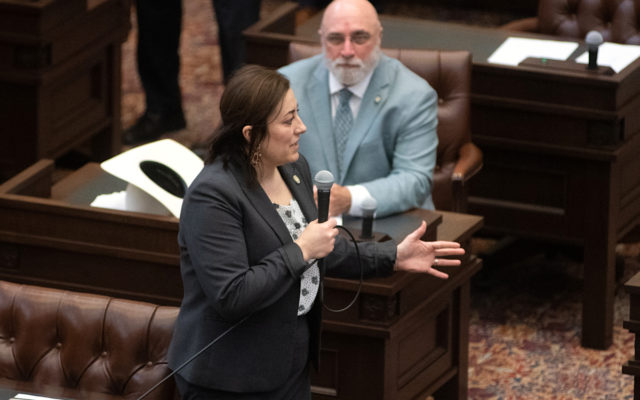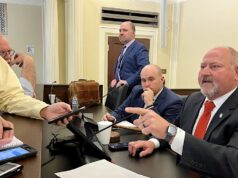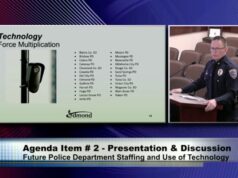

A voicemail left Friday for Sen. Jessica Garvin threatened a “shootout” with state law enforcement agencies regarding HB 2179, which proposes an increase in license fees for Oklahoma medical marijuana grow operations. NonDoc has agreed not to publish the name of the caller at this time owing to an ongoing criminal investigation into the threatening voicemail.
“I am calling to let the sellout know that we are all against HB 2179. If it does pass, we will continue to operate if we have to fire the shots heard around the world,” said the caller. “We’re not scared of the [Oklahoma Bureau of Narcotics and Dangerous Drugs]. We are not scared of the [Oklahoma State Bureau of Investigation]. We are not scared of government fucking period.”
OSBI spokeswoman Brook Arbeitman said her agency has original jurisdiction to investigate threats against public officials, but the caller identified himself as a tribal citizen living in eastern Oklahoma.
“Because of the suspect’s tribal status and based on the McGirt Supreme Court ruling, we forwarded that investigation to the FBI,” Arbeitman said. “The OSBI takes threats to lawmakers extremely seriously, and we do all that we can to ensure their safety and security by working with our law enforcement partners.”
In the voicemail (embedded below with identifying information redacted), the caller says he is the co-owner of a business in Sequoyah County and a citizen of the Cherokee Nation.
“If you motherfuckers want some, I will continue to operate. I will not fucking pay more for my license. So when I continue to operate when this bill passes, you bring your fucking asses to [my business in Sequoyah County] and we’ll have a fucking shootout right in the parking lot. Be sure to bring the Cherokee Nation, because my first citizenship is Cherokee, so you might want to bring them, bitches. Fuck all of you sellout fucking government pieces of shit.”
Julie Hubbard, communications director for the Cherokee Nation, provided a statement condemning the man’s voicemail.
“The Cherokee Nation does not condone threats of any kind against public officials, regardless of the subject,” Hubbard said. “If applicable, we will work with the relevant authorities regarding this matter, and we continue to work closely with our partners on upholding public safety on our reservation.”
‘It’s shameful that people resort to this type of rhetoric’
Garvin (R-Duncan) became the principal Senate author of HB 2179 on April 7. She provided audio of the voicemail to NonDoc and said she is glad that law enforcement is taking the matter seriously.
“Unfortunately, this isn’t the first time my office has received threats about public policy. Each time, our Oklahoma Highway Patrol, Senate security team and the OSBI has taken these threats seriously and have gone out of their way to make my family and me feel safe,” Garvin said. “I appreciate their dedication to my colleagues, our families and to me and will continue to work with these groups as they do the incredible work they are called to do.”
HB 2179 is co-authored by Rep. Scott Fetgatter (R-Okmulgee), who has led much of the medical marijuana policy discussion in the House. He said he had heard the voicemail left for Sen. Jessica Garvin.
“It’s shameful that people resort to this type of rhetoric and conversation in these scenarios. The legislative process is a long, grueling process, and it’s very difficult before things become a law,” Fetgatter said. “But to specifically threaten legislators with physical harm is something that should be taken very seriously, and I hope that law enforcement makes a visit and handles this situation with this particular person.”
Fetgatter said people should not view the individual’s voicemail as representative of the medical marijuana industry as a whole.
“Most of the people I work with in the marijuana industry are business owners and patients and just concerned citizens, and they are very respectful,” Fetgatter said. “Most people that I talk to don’t want to do anything to harm legal business owners, but because of the failures of [Oklahoma Medical Marijuana Authority] over the past four years — while things are moving in the right direction now with the new director — but those failures have created an environment that is somewhat hostile in the state of Oklahoma.”
Fetgatter said HB 2179’s proposed increase in marijuana grow operation license fees — hiking them from a flat $2,500 across the board to a calculation where grows larger than 1,667 square feet in size are charged $1.50 per square foot — is part of a larger batch of medical marijuana bills now in limbo.
“The licensing fee bill was part of a larger package of regulations and framework for the industry moving forward, and at this point it’s effectively dead until we have some agreement,” he said. “The fee increase was actually a request by the governor during the State of the State. He asked the Legislature to increase licensing fees. He brought up several different states. I personally don’t agree that that solves any problems in the marijuana industry, but I carried the bill at his request to see what else we can get figured out to reign in this illegal marijuana situation that we have going on across the state.”
As happened last year and in 2020, proposed medical marijuana reforms could be among the final policy topics hashed out at the end of the legislative session.
“Quite frankly, the Senate has not given us their priorities on medical marijuana reform, so we will have to negotiate those reforms out now in conference (committees),” Fetgatter said. “The problem is, in Oklahoma, it’s just so wide open, and there has been no enforcement so that it has created a really hostile environment.”




















